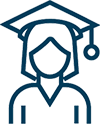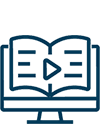
Medical Humanities is an interdisciplinary field that includes the humanities, social sciences, and the arts and their application to medical education and practice. The Medical Humanities Track will provide insight into the human condition, suffering, personhood, and our responsibility to each other. Using literature (first-person physician/patient narratives, memoirs, and fiction) and the arts (film, theater, visual arts), the various components of the track are designed to help students develop and nurture skills of observation, analysis, empathy, and self-reflection, skills that are essential for humane medical care.
Program Objectives
- Take a critical view of important and influential approaches to humanities and medicine.
- Develop skills in listening to patients’ stories through a study of narrative and writing.
- Address questions about how to identify the way that social norms and values function in the medical arena.
Meet Your Medical Humanities Director
Track Activities
Required First-Second Year Activities
Attend an occasional lecture, complete three six-week courses in the humanities, participate in an experiential opportunity in the summer following first year, submit a project proposal, and complete a project.
Medical Humanities Course Offerings May Include:
- Transitions
- Commix
- Ethics
- Film and Medicine
- History of Medicine
- Literature and Medicine
- Literature, Medicine, and Public Health
- Narratives in and of Medicine
Experiential Opportunity:
- The project proposal includes scope of work, a timeline, objectives/goals, and the organization/mentor with which the student will be working, including contact information.
- After project completion, students are required to submit a paper (12 pages minimum) to include the student’s project scope, the role the student played in the project, how the project changed from the original proposal, and reflections on the experience. If the project involves writing and little or no “hands-on” experience, a longer paper is required. Examples of a writing project include, but are not limited to, research on a medical humanities topic, creating a model syllabus, reading and annotating texts or films in the area of medical humanities.
Required Third & Fourth Year Activities
- Scholarly project tailored to their medical humanities program (Scholarly Project Outline form can be downloaded HERE).
- Complete senior elective in medical humanities: Med 522 - Narratives of Medicine
Optional Activities
- Medical School book group
- Film groups
- Guided tours with emphasis on art and medicine in local museums
Track Lecture Series
Topic Areas May Include:
- Play Performance (by students or guest performers)
- Poetry and Illness
- Film and Medicine
- Text Analysis and Discussion
Experiential Opportunities
- Summer internships of any sort are excellent sources for the track; students write about the experience from a humanistic point of view (see above).
Current Literature
Journals:
Academic Medicine (https://journals.lww.com/academicmedicine/pages/default.aspx)
British Medical Journal (http://mh.bmj.com/content/early/recent)
American Medical Association Journal of Ethics (articles on the ethics of writing about patients, reflective writing, blogging and ethics, etc.)
ARS MEDICA is a new biannual literary journal that explores the interface between the arts and medicine, and examines what makes medicine an art. ARS MEDICA allows a place for dialogue, meaning making, and the representation of experiences of the body, health, wellness, and encounters with the medical system. Content includes narratives by patients and healthcare workers, medical history, fiction, creative nonfiction, poetry, and visual art.
Literature and Medicine (Johns Hopkins University Press (online at Project Muse).
The Journal of Medicine and Philosophy (Oxford University Press).
The Bellevue Literary Review. (Bellevue Literary Review).
Narrative Matters: http://www.healthaffairs.org/press/sepoct0607.htm
Books and articles:
Belling, Catherine. A Condition of Doubt: the Meaning of Hypochondria. New York: Oxford University Press, 2013.
Charon, Rita. Narrative Medicine: Honoring the Stories of Illness. New York: Oxford University Press, 2006
Montgomery, Kathryn. How Doctors Think: Clinical Judgment and the Practice of Medicine. New York: Oxford UP, 2005.
Montgomery, Kathryn. “Literature, Literary Studies, and Medical Ethics: The Interdisciplinary Question”. Hastings Center Report: 31.3 (2001).
Poems from Both Sides of the Fence: A Disabled Physician's Experiences in Medicine by Beryl Lawn, MD and published by Texas Review Press. (The poems in the book are related to experiences in being both a doctor and a patient. All touch on the reaction of patients to a physician with a visible disability).
Shapiro, Joanna. Illness Narratives: reliability, authenticity and the emphatic witness
http://mh.bmj.com/cgi/content/abstract/jmh.2011.007328v1?papetoc
*Students will receive further reading recommendations, including scholarly books and articles, fiction, and essays that are relevant to the study of medicine and humanities.
**Other educational opportunities and activities to enrich students’ experiences may be added to the curriculum during the program, per the discretion of the Track Director.



